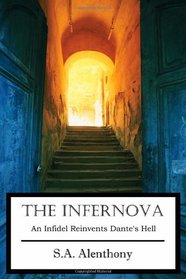Helpful Score: 1
"The Infernova" by S. A. Alenthony ISBN 978-0-9819678-9-9
Review by Chris Phillips
The subtitle, An Infidel Reinvents Dante's Hell, is an accurate description of this epic poetic work. Alenthony has taken the premise that modern science has removed the reason and the reasonableness of religion and religious practice and after much effort produced a work comparable to Dante's "Inferno". The introduction does much to explain why Alenthony takes this viewpoint. Alenthony artistically illustrates his beliefs in this book.
With the premise of secular humanism without the name, Alenthony writes 34 Cantos describing what he sees in a dream with a special conductor/guide (Mark Twain). His journey takes him through the representation of Hell as Alenthony reinvents it. Along the way there are some very interesting cameos and guest appearances, including Albert Einstein, the author's personal hero, to Mary Baker Eddy and, the author's dilemma, Ellen Jean White, through the gods and goddesses of ancient times.
Although the literary element of âterza rime,â as Dante used in the "Inferno", does tend to take over the discourse, the ideas portrayed are entertainingly discernible. The logic behind each ring of Hell and each encounter is often paramount to the Canto as in the dreamer's conversation with Descartes:
ââ¦One final quote of mine, please let me tell;
âIt is not enough to have a good mind;
the important thing is to use it well.'
To this good maxim I sometimes was blind.
So think hard, doubt, and reject the unclear,
And with your bravest face on, you will find
a brighter star by which the wise might steerâ¦â
The choices of punishments are at the worst, appropriate, and at the best, sublimely rich and eloquent. If the reader needs more guidance, each Canto carries a brief, usually one word description of the type of persons inhabiting that section of Hell. Canto IV is described as "Intelligent Mystics", for example.
The amount of work evident in the book reveals a dedication to the art of literary practice. Alenthony's consistent maintenance of the rhyming pattern as well as artistic coining of words highlights the passion in these lines.
The book is highly recommended to all readers. Those interested in the religious and philosophical ideas will appreciate the wit and scything humor of the tale.
Published by Blackburnian Press, PO Box 385591, Bloomington, Minnesota 55438 (www.blackburnianpress.com) (11.66 USD SRP/Amazon $11.66 USD) Reviewer received book from the publisher.
Review by Chris Phillips
The subtitle, An Infidel Reinvents Dante's Hell, is an accurate description of this epic poetic work. Alenthony has taken the premise that modern science has removed the reason and the reasonableness of religion and religious practice and after much effort produced a work comparable to Dante's "Inferno". The introduction does much to explain why Alenthony takes this viewpoint. Alenthony artistically illustrates his beliefs in this book.
With the premise of secular humanism without the name, Alenthony writes 34 Cantos describing what he sees in a dream with a special conductor/guide (Mark Twain). His journey takes him through the representation of Hell as Alenthony reinvents it. Along the way there are some very interesting cameos and guest appearances, including Albert Einstein, the author's personal hero, to Mary Baker Eddy and, the author's dilemma, Ellen Jean White, through the gods and goddesses of ancient times.
Although the literary element of âterza rime,â as Dante used in the "Inferno", does tend to take over the discourse, the ideas portrayed are entertainingly discernible. The logic behind each ring of Hell and each encounter is often paramount to the Canto as in the dreamer's conversation with Descartes:
ââ¦One final quote of mine, please let me tell;
âIt is not enough to have a good mind;
the important thing is to use it well.'
To this good maxim I sometimes was blind.
So think hard, doubt, and reject the unclear,
And with your bravest face on, you will find
a brighter star by which the wise might steerâ¦â
The choices of punishments are at the worst, appropriate, and at the best, sublimely rich and eloquent. If the reader needs more guidance, each Canto carries a brief, usually one word description of the type of persons inhabiting that section of Hell. Canto IV is described as "Intelligent Mystics", for example.
The amount of work evident in the book reveals a dedication to the art of literary practice. Alenthony's consistent maintenance of the rhyming pattern as well as artistic coining of words highlights the passion in these lines.
The book is highly recommended to all readers. Those interested in the religious and philosophical ideas will appreciate the wit and scything humor of the tale.
Published by Blackburnian Press, PO Box 385591, Bloomington, Minnesota 55438 (www.blackburnianpress.com) (11.66 USD SRP/Amazon $11.66 USD) Reviewer received book from the publisher.




